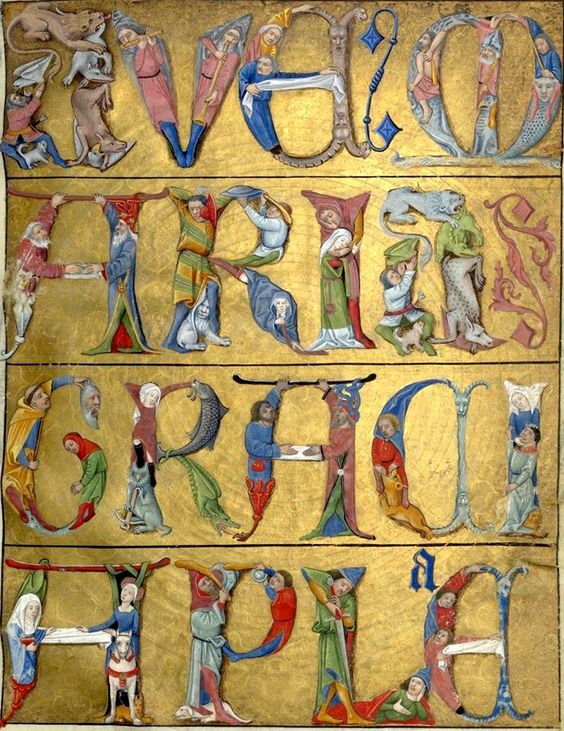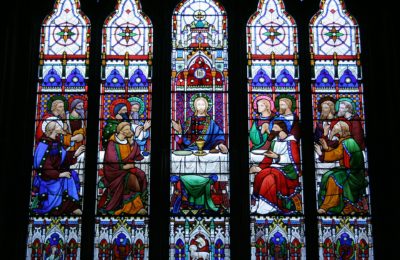In mid-September, as the leaves are beginning to turn to yellow, the Roman Catholic Church commemorates the Most Holy Name of Mary. The Church’s liturgy for today (the Roman rite) is a veritable feast which delights in the contemplation of this holy name as seen here. Dom Prosper Gueranger (b. 1805- d. 1875) in his book The Liturgical Year had much to say about this day; and it is worth a read. Here is Dom Prosper’s writing on the Most Holy Name of Mary:
“And the Virgin’s name was Mary” (Luke i. 27). Let us speak a little about this name which signifies star of the sea, and which so well befits the Virgin Mother. Rightly is she likened to a star: for as a star emits its ray without being dimmed so the Virgin brought forth her Son without receiving any injury. The ray takes nought from the brightness of the star, nor the Son from His Mother’s integrity. This is the noble star risen out of Jacob, whose ray illumines the whole world, whose splendour shines in the heavens, penetrates the abyss, and, traversing the whole earth, gives warmth rather to souls than to bodies, cherishing virtues, withering vices. Mary, I say, is that bright and incomparable star, whom We need to see raised above this vast sea, shining by her merits, and giving us light by her example.
Oh! whoever you are that sees yourself, amid the tides of this world, tossed about by storms and tempests rather than walking on the land, turn not your eyes away from the shining of this star if you would not be overwhelmed by the hurricane. If squalls of temptations arise, or you fall upon the rocks of tribulation, look to the star, call upon Mary. If you are tossed by the waves of pride or ambition, detraction or envy, look to the star, call upon Mary. If anger or avarice or the desires of the flesh dash against the ship of your soul, turn your eyes towards Mary. If, troubled by the enormity of your crimes, ashamed of your guilty conscience, terrified by dread of the judgement, you begin to sink into the gulf of sadness or the abyss of despair, think of Mary. In dangers, in anguish, in doubt, think of Mary, call upon Mary. Let her be ever on your lips, ever in your heart. And the better to obtain the help of her prayers, imitate the example of her life. Following her, you stray not. Invoking her, you despair not. Thinking of her, you wander not. Upheld by her, you fall not. Shielded by her, you fear not. Guided by her, you grow not weary. Favoured by her, you reach the goal. And thus do you experience in yourself how good is that saying: “And the Virgin’s name was Mary.”
Thus speaks the devout Saint Bernard in the name of the Church. But his pious explanation does not exhaust the meanings of this blessed name of Mary. Saint Peter Chrysologus adds in this same night Office: “Mary in Hebrew signifies lady or sovereign: and truly the authority of her Son, who is the Lord of the world, constituted her Queen, both in fact and in name, from her very birth.”
OUR LADY: such is the title which befits her in every way, as that of OUR LORD beseems her Son. It is the doctrinal basis of that worship of hyperdulia which belongs to her alone. She is below her Son, whom she adores as we do, but above all God’s servants, both angels and men, inasmuch as she is His Mother. At the name of Jesus every knee is bent. At the name of Mary every head is bowed. And although the former is the only name by which we may be saved, yet, as the Son can never be separated from His Mother, Heaven unites their two names in its hymns of praise, Earth in its confidence, Hell in its fear and hatred.
It was therefore in the order of divine Providence that devotion to the most holy name of Mary should spread simultaneously with the cultus of the adorable name of Jesus, of which Saint Bernadino of Siena was the apostle in the fifteenth century. In 1513 the Church of Cuenca in Spain was the first to celebrate, with the approbation of the holy See, a special feast in honour of the name of Mary, while the Franciscan Order had not yet succeeded in obtaining a like privilege for the adorable name of Jesus. The reason of this is that the memory of that sacred name included in the feast of the Circumcision seemed to the prudence of the Pontiff to suffice. From the same motive we find the feast of the most holy name of Mary extended to the universal Church in the year 1683, and that of the most holy name of Jesus not until 1721.
Two glorious triumphs, two victories won under the protection of Our Lady, have rendered this present day illustrious in the annals of the Church and of history.
Manicheism, revived under a variety of names, had established itself in the south of France, from where it hoped to spread its reign of shameless excess. But Dominic appeared with Mary’s Rosary for the defence of the people. On September 12, 1213, Simon de Montfort and the crusaders of the faith, one against forty, crushed the Albigensian army at Muret. This was in the pontificate of Innocent III.
Nearly five centuries later, the Turks, who had more than once caused the West to tremble, again poured down upon Christendom. Vienna, worn out and dismantled, abandoned by its emperor, was surrounded by 300,000 infidels. But another great Pope, Innocent XI, again confided to Mary the defence of the baptised nations. Sobieski, mounting his charger on the feast of our Lady’s Assumption, hastened from Poland by forced marches. On the Sunday within the octave of the Nativity, September 12, 1683, Vienna was delivered. And then began for the Osmanlis that series of defeats which ended in the treaties of Carlowitz and Passarowitz, and the dismemberment of the Ottoman empire. The feast of the most holy name of Mary inscribed on the calendar of the universal Church, was the homage of the world’s gratitude to Mary, our Lady and Queen.
Epistle – Ecclesiasticus xxiv. 23‒31:
As the vine I have brought forth a pleasant odour, and my flowers are the fruit of honour and riches. I am the mother of fair love, and of fear, and of knowledge, and of holy hope. In me is all grace of the way, and of the truth, in me is all hope of life and of virtue. Come over to me, all ye that desire me, and be filled with my fruits; for my spirit is sweet above honey, and my inheritance above honey and the honeycomb. My memory is unto everlasting generations. They that eat me, will yet hunger; and they that drink me, will yet thirst. He that hearkens to me, will not be confounded, and they that work by me will not sin. They that explain me will have life everlasting.
Thanks be to God.
Dom Prosper Guéranger:
All the delight of Heaven, all the hopes of Earth, are centred on the cradle where Mary sleeps, while her heart is watching before God. Wisdom praises her own self. By the blessed daughter of Anne and Joachim, the loving preference shown by that divine Wisdom from the beginning of the world, is already justified. Forever more it will be her delight to be with the children of men. The chosen vine, the vine of the Peaceful One is before us, announcing, by its fragrant blossom, the divine grape, whose juice, pressed out in the wine-press of the cross, will give fruitfulness to every soul, and will inebriate Earth and Heaven.
Gospel – Luke i. 26‒38:
At that time the angel Gabriel was sent from God into a city of Galilee called Nazareth, to a Virgin espoused to a man whose name was Joseph, of the house of David: and the Virgin’s name was Mary. And the angel being come in, said unto her: “Hail, full of grace, the Lord is with you; blessed are you among women.” Who having heard, was troubled at his saying, and thought within herself what manner of salutation this should be. And the angel said to her: “Fear not, Mary, for thou hast found grace with God. Behold you will conceive in your womb, and will bring forth a son and you will call his name Jesus. He will be great, and will be called the Son of the Most High, and the Lord God will give him the throne of David his father: and he will reign in the house of Jacob for ever. And of his kingdom there will be no end.” And Mary said to the angel: “How will this be done, because I know not man?” And the angel answering, said to her, “The Holy Ghost will come upon you, and the power of the Most High will overshadow you. And therefore also the Holy which will be born of you, will be called the Son of God. And behold your cousin Elizabeth, she also has conceived a son in her old age; and this is the sixth month with her that is called barren: because no word will be impossible with God.” And Mary said: “Behold the handmaid of the Lord, be it done to me according to your word.”
Praise be to you, O Christ.
Dom Prosper Guéranger:
This is the most solemn embassy ever recorded in the history of angels or of men. It shows us how Mary is what her name signifies, Mistress of the world. The highest interests of the human race, past, present and to come, of the heavenly hierarchy, and of God Himself, are here at stake. And the transaction is carried on between the Most High and the Virgin of Nazareth alone, as having exclusive right, the One to propose, the other to accept, both to conclude. The angel is but a messenger. Man, too, stands in waiting. Mary enters into a contract with the Creator, in the name of angels and of men, as in her own name; in the name of the entire world, which she represents, and over which she reigns supreme. Hail, then, to our Queen on her birthday! All hail to Mary! May she herself, in the holy Sacrifice, present our offerings to God for her people.
O Mary, we say to you with your faithful client, Saint Anselm of Canterbury: ‘By the name of your beloved Son, grant us ever to keep the memory of your own sweetest name. May it be the delicious food of our souls. May it be with us in danger. May it be with us in anguish. May it be to us the beginning of all joy! (source)
Today, I assent to the last paragraph of Dom Prosper (above) where he prays: O Mary, we say to you with your faithful client, Saint Anselm of Canterbury: ‘By the name of your beloved Son, grant us ever to keep the memory of your own sweetest name. May it be the delicious food of our souls. May it be with us in danger. May it be with us in anguish. May it be to us the beginning of all joy!
Hail Mary!
May you have a good day.
~SCF
~Image: print of a 15th century illuminated manuscript, source.






